Estate agents, housebuilders and the outlook for UK house prices
For the last two or three years, the UK housing market has gone nowhere. Dominic Frisby finds out if that’s likely to change in 2018.

Get the latest financial news, insights and expert analysis from our award-winning MoneyWeek team, to help you understand what really matters when it comes to your finances.
You are now subscribed
Your newsletter sign-up was successful
Want to add more newsletters?

Twice daily
MoneyWeek
Get the latest financial news, insights and expert analysis from our award-winning MoneyWeek team, to help you understand what really matters when it comes to your finances.

Four times a week
Look After My Bills
Sign up to our free money-saving newsletter, filled with the latest news and expert advice to help you find the best tips and deals for managing your bills. Start saving today!

Today we consider the UK housing market.
The outlook has not been clear for some time. On the one hand, in many parts of the country, house prices are "too expensive" by just about any traditional measure, and need to fall.
On the other, sellers have mostly refused to lower their prices. And government intervention, whether via low interest rates or high stamp duty, has only added to the atrophy.
MoneyWeek
Subscribe to MoneyWeek today and get your first six magazine issues absolutely FREE

Sign up to Money Morning
Don't miss the latest investment and personal finances news, market analysis, plus money-saving tips with our free twice-daily newsletter
Don't miss the latest investment and personal finances news, market analysis, plus money-saving tips with our free twice-daily newsletter
The result, for two or three years now, has been stagnation. Neither the bulls nor the bears have won the argument.
Will that change in 2018?
Sing me a sad song for the estate agents
In 1999, before the great era of central bank interest-rate intervention began, the ratio of house prices to earnings stood at 3.7. Today, according to the Office for National Statistics, the house-price-to-earnings ratio stands at 7.6.
This varies considerably by region. Copeland, West Cumbria, is the most affordable part of the country (in terms of local earnings) at 2.8 times the average pay packet. Kensington and Chelsea is where the ratio is at its highest at 38.5 times.
Of course, this is just one measure of affordability. Earnings do not matter so much if you already own a property. What is more important are financing costs; low interest rates have made mortgage repayments very cheap for a very long time.
And as an indicator of whether to buy or sell, the house-price-to-earnings ratio has not worked for many years. As regular readers know, I like look to other bellwethers the state of the companies that operate in the sector: the estate agents, the portals and the builders.
We'll start with the estate agents. (NB: all of these charts are three-year charts. The red and blue lines are the one-year and 55-day moving averages, which will give you an idea of the trend.)
Here's Countrywide (LSE: CWD), the UK's largest estate agent.
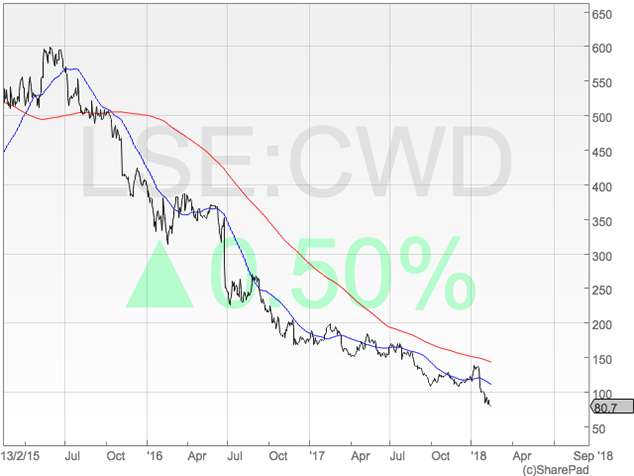
This is not good. At all. What was a 600p stock three years ago is now an 80p stock. New lows were hit just this week. The decline is inexorable.
London-centric Foxtons (LSE: FOXT) is not much better.
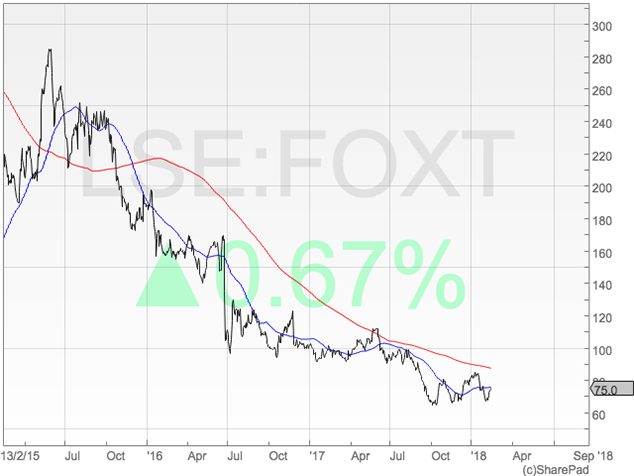
From 290p in 2015 to lows around 65p. What is more positive about Foxtons is that there appears to be some sort of stabilisation around the 65p level. The 55-day moving average is now sloping upwards, ever so slightly, indicating a change in trend. The worst for Foxtons could be over.
One obvious reason for the weakness in these two agents might be that they have lost market share to cheaper, online versions such as Purplebricks (LSE: PURP). The story here is almost the complete opposite. In terms of share price performance, it has done everything the traditional agents haven't. From below 100p to over 500p.
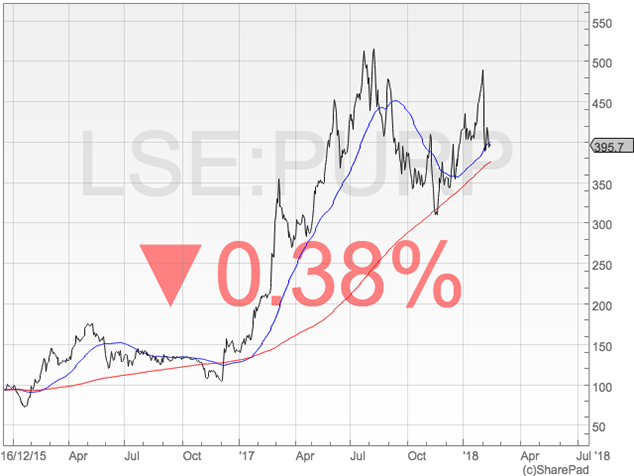
However, even although both the one-year and 55-day moving averages are sloping up, indicating a rising trend, I would be nervous owning this stock. You could make the argument that it is fully valued: its market cap is over a billion, last year it was loss-making, this year its forecast P/E is 600.
But my main concern is that chart. It has double-top written all over it and my instinct says it has run out of steam at 500p. It is one that could easily come back to earth with a bump.
Property portal Rightmove (LSE: RMV) hit new highs at the beginning of the year, though those gains have since been given back. Looks like a range-trader to me.
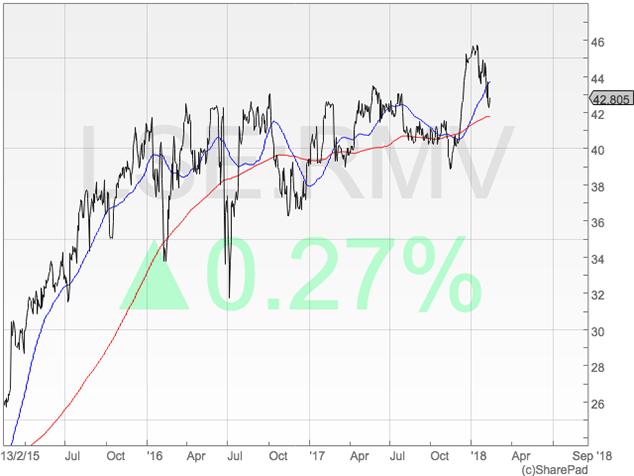
Zoopla (LSE: ZPG), on the other hand, is now trending lower, having had an excellent 2015 and 16.
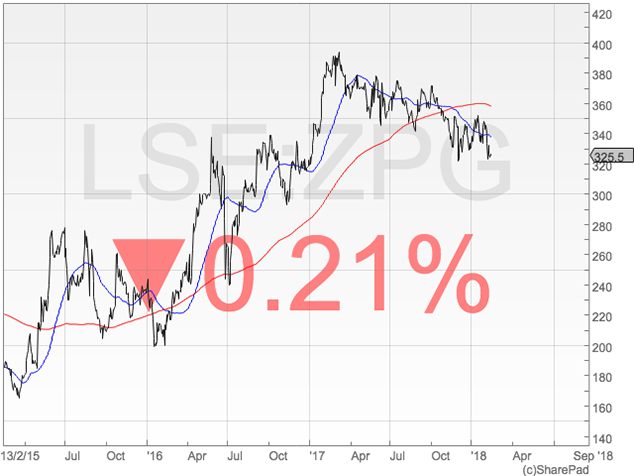
Are the good times over for the housebuilders?
So to the builders. These have been one of the success stories of the post-financial crisis era. And I'm going to use five-year charts for these.
Let's start with the biggest, Barratt (LSE: BDEV).
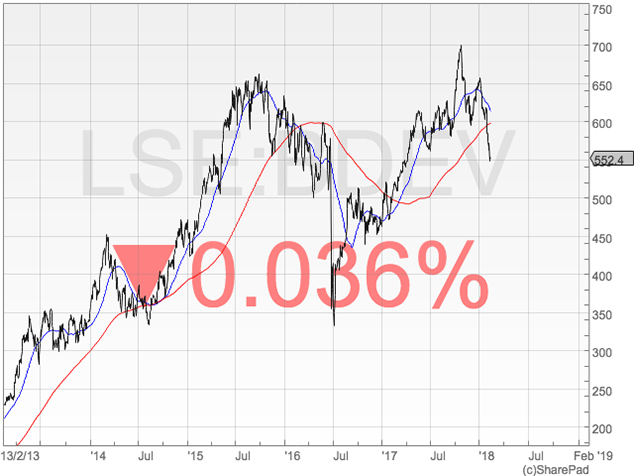
I've got to say, based on hocus pocus charts alone, I would be very worried owning this stock. It, too, has got double top written all over it.
In October last year it looked like it was breaking out to new highs, but that's proved to be a false break, and since then it has gone from 700p to 550p at some speed. I can't help thinking 350p beckons.
Taylor Wimpey (LSE: TW) is telling the same story.
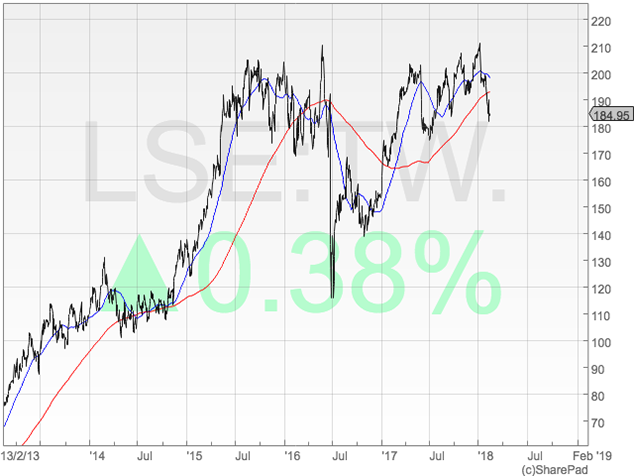
Persimmon (LSE: PSN) has been probably the stand-out performer, bucking the double top of the others.
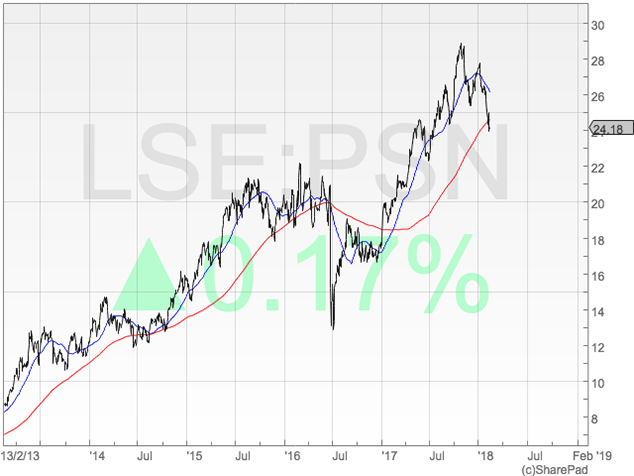
It hit that same wall last October, and now it's turned down.
Finally, here's Berkeley Group (LSE:BKG), which peaked around the beginning of the year.
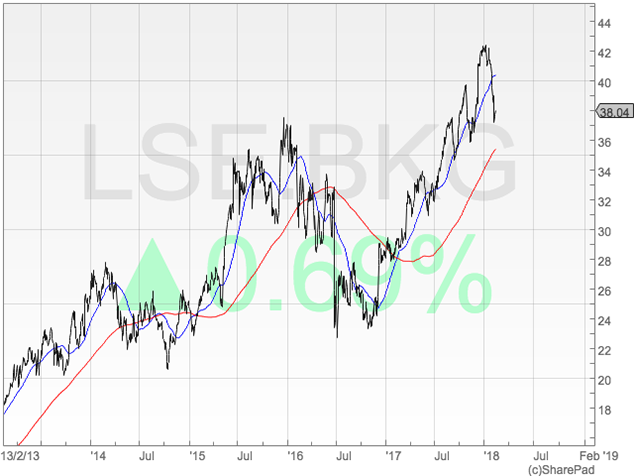
It has done extremely well.
Overall, it's not looking good for property - but a crash is unlikely
I turned bearish on London new-builds in 2015, because of the over-supply of not-particularly-nice two-bed flats coming to market (I was the first onto that particular story).
But it was impossible to be bearish on UK property as a whole, because, even if the estate agents were weak, the builders were strong. (There were also company-specific reasons for the agents' weakness).
But looking now at the agents, the portals and the builders; looking at current property valuations; at the outlook for interest rates; at the stagnancy in the market, and the sheer cost of buying a place to live it all makes me bearish.
Yet property remains a religion in the UK. For those that own, a house remains their most valuable asset. No government wants a property crash on their watch.
The market has become quite area-specific. London new-build remains a disaster zone. But in general my call is this: more stagnation and atrophy with a slightly downward bias, but a crash such as we saw in 1989, despite current overvaluations and demographics, remains unlikely.
Happy Valentine's Day to all. Go and give your loved one a big fat kiss!
Get the latest financial news, insights and expert analysis from our award-winning MoneyWeek team, to help you understand what really matters when it comes to your finances.

-
 Average UK house price reaches £300,000 for first time, Halifax says
Average UK house price reaches £300,000 for first time, Halifax saysWhile the average house price has topped £300k, regional disparities still remain, Halifax finds.
-
 Barings Emerging Europe trust bounces back from Russia woes
Barings Emerging Europe trust bounces back from Russia woesBarings Emerging Europe trust has added the Middle East and Africa to its mandate, delivering a strong recovery, says Max King